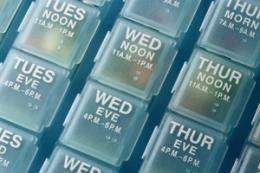Reminder packaging helps patients take medications as directed

People with chronic illnesses are more likely to take long-term medications according to doctors’ instructions if the packaging includes a reminder system, according to a new review of evidence.
Reminder packaging improves both the number of doses taken and clinical measures of medication effectiveness, such as blood pressure.
Although most of the studies included in the review were small and of low-to-moderate quality, it provides enough evidence that policymakers and pharmaceutical companies should “sit up and take notice,” said lead author Kamal Mahtani, M.D, of the Oxford University, in England.
Estimates suggest that 40 percent to 60 percent of people do not take medication as prescribed, the reviewers write. People may miss taking prescribed medication because of forgetfulness, changing medication schedules or busy lifestyles.
“This issue has been rising up the radar screen, because of increasing concern about chronic disease in this country,” said Tom Hubbard, a senior program director at NEHI, an independent health policy institute in Cambridge, Mass. “Unless ways are found to correct poor adherence, it will frustrate efforts to get better outcomes at lower costs.”
The review appears in the current issue of The Cochrane Library, a publication of The Cochrane Collaboration, an international organization that evaluates research in all aspects of health care. Systematic reviews draw evidence-based conclusions about medical practice after considering both the content and quality of existing trials on a topic. Funding for this review was provided by the United Kingdom’s National Institute of Health Research.
The review by Mahtani and co-authors is an update of a 2006 Cochrane review. The new analysis includes 12 randomized controlled trials involving nearly 2,200 participants taking self-administered medications for at least one month. Four of the studies were completed since the previous review.
Four studies provide data on pill counts, revealing that reminder packaging increases the percentage of pills taken by 11 percent to 13 percent. Combined analysis of data from two trials focusing on hypertension found that reminder packaging significantly improved diastolic blood pressure – the “bottom” number in a blood pressure reading. Although systolic pressure remained unchanged, it is noteworthy that “medication packaging has an effect not only on adherence, but also on clinical outcomes,” Mahtani said.
The remaining studies were either of poor quality or showed no significant difference between people who received reminder packaging and those who did not. “There continues to be an overall paucity of high-quality trials carried out in this subject area,” the reviewers wrote. Furthermore, patients who are able to participate in research studies may not be those most in need of medication reminders.
The studies involve various prescription or over-the-counter medications for chronic health conditions, and several types of packaging. Patients in the studies include people with hypertension, diabetes, chronic mental illness or allergies. Some of the studies focused on specific populations such as healthy adults taking vitamin supplements, senior citizens with multiple medical conditions, and people with chronic medical conditions and low literacy skills.
In most of the interventions, the reminder packages consisted of prefilled pill boxes or foil-backed blister packaging. In one study, the medication was packaged in a reminder device, with an alarm that sounded daily as a reminder to take the tablet. In a study of people with low literacy levels, some patients received a pictorial representation of which pill to take, when to take it and what it was for. The review excluded studies involving reminder technology, such as packaging that transmits a wireless message when a dose is missed.
“It is apparent to a lot of practitioners in the field that effective adherence interventions are highly dependent on the health condition and the characteristics of the patient,” Hubbard said. It would be helpful if future research could identify, in greater detail, which patients with which conditions would benefit from reminder packaging, he added. The reviewers suggest that a fruitful research avenue would be looking at how reminder packaging could improve adherence and outcomes for hypertension medication.
“Billions of people in the world are on hypertension medication,” says Mahtani. “The scope is enormous. But there’s no point in developing more medications if people are only taking 50 percent of the pills. We need to take a step back and think about how we’re delivering the medication in the first place.”
More information: Mahtani KR, et al. Reminder packaging for improving adherence to self-administered long-term medications. Cochrane Database of Systematic Reviews 2011, Issue 9.














